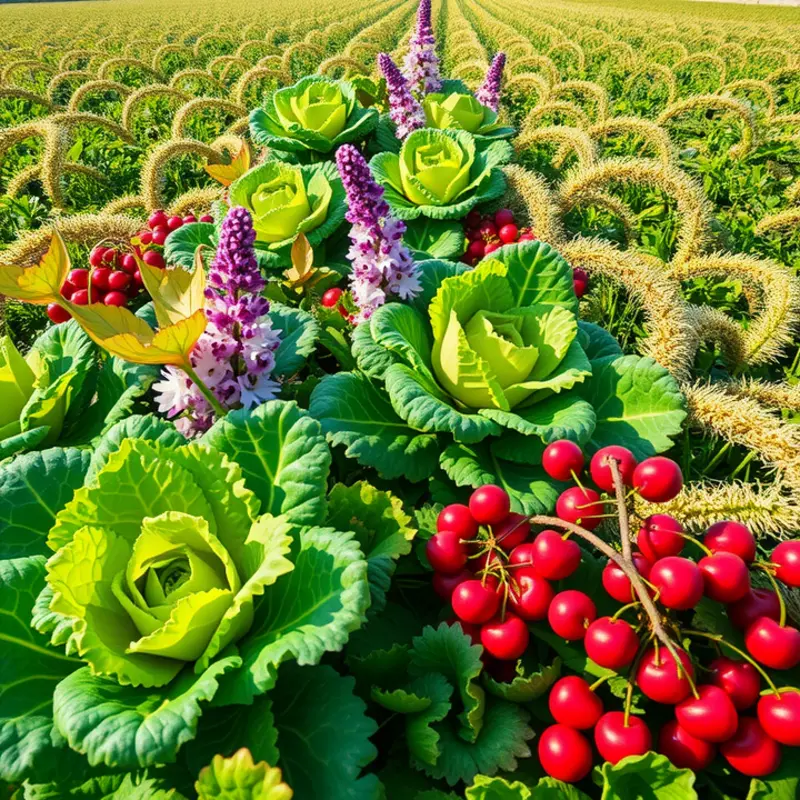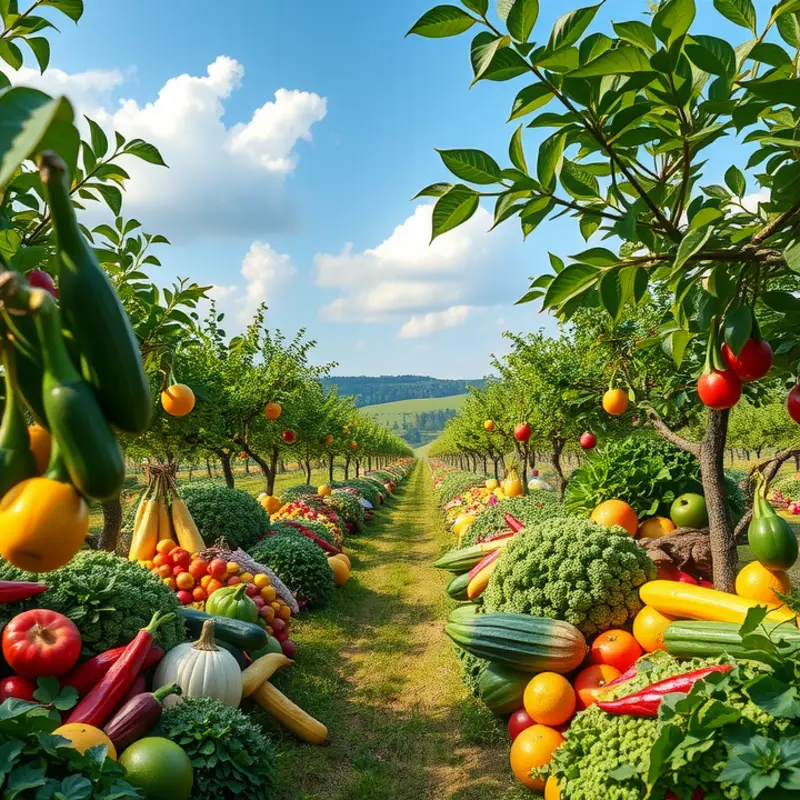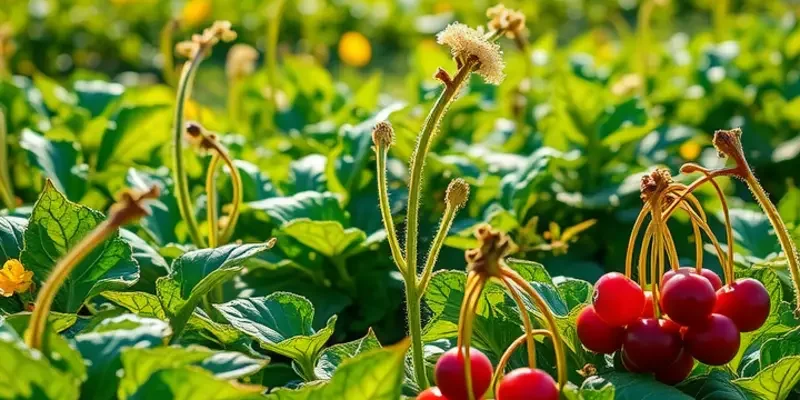As the popularity of veganism continues to rise, a focus on nutritional diversity within plant-based diets is becoming increasingly important. This movement emphasizes a wider array of foods that not only satisfy various dietary needs but also tantalize taste buds. Explore the innovative trends shaping this dynamic dietary landscape and discover how to create balanced, flavorful vegan meals at home.
The Rise of Plant-Based Superfoods

The ascent of plant-based superfoods in vegan diets underscores a growing awareness about nutrition and wellness. Superfoods are typically dense in nutrients, offering a multitude of health benefits that appeal to both vegans and health enthusiasts alike. Their inclusion in vegan diets not only enhances nutritional diversity but also supports various health functions.
One of the most popular vegan superfoods is chia seeds. These tiny seeds are packed with omega-3 fatty acids, fiber, and protein. Chia seeds are versatile, easily incorporated into smoothies, puddings, or sprinkled on salads, providing a nutritional boost with minimal preparation. Their high fiber content aids digestion, while omega-3s support heart health.
Another prominent superfood is spirulina, a type of blue-green algae. Spirulina is highly revered for its rich protein content and offers a bounty of vitamins and essential minerals like iron and calcium. Its antioxidant properties help combat oxidative stress, making it a favorite among those who emphasize anti-inflammatory diets. Often consumed in powder or tablet form, spirulina can be mixed into beverages or added to meals.
Quinoa has gained accolades for its high protein and fiber content. As a complete protein, quinoa supplies all nine essential amino acids, which are vital for muscle recovery and growth. Additionally, quinoa’s magnesium content helps regulate blood sugar and promotes cardiovascular health. Its adaptability in vegan cuisine ranges from hearty bowls to baked dishes.
Hemp seeds are another star in the superfoods constellation, celebrated for their optimal balance of omega-6 and omega-3 fatty acids. They boast high levels of magnesium, zinc, and iron. Additionally, hemp seeds provide a robust source of plant-based protein, which is crucial for muscle repair and overall cellular function. These seeds are easily integrated into vegan diets through shakes, salads, or as a topping for various dishes.
Acai berries have also surged in popularity, primarily for their antioxidant power. Packed with nutrients such as vitamin A, acai aids in skin health and immune function. Its anti-inflammatory properties offer further benefits, potentially reducing the risk of chronic diseases. Acai smoothies and bowls are a common sight in vegan eateries, with the berry’s vibrant color and refreshing taste appealing to many palates.
These superfoods exemplify how vegan diets are evolving to meet the nutritional requirements of health-conscious individuals. By incorporating these nutrient-dense ingredients, vegans can enjoy diverse palate-pleasing meals while reaping significant health benefits. For more information on how other ingredients can support wellness, you might explore functional herbs for mood stability.
As the popularity of veganism expands, the integration of superfoods into everyday diets becomes ever more crucial. They not only enhance physical well-being but encourage mindful eating practices, ultimately creating a more nutritionally balanced lifestyle within the plant-based community.
Flavorful Innovations in Vegan Cooking

The landscape of vegan cooking is experiencing a renaissance, driven by adventurous experimentation with flavors and techniques. Seasoned chefs and home cooks alike explore the multifaceted world of spices to create plant-based dishes that are not only nutritionally rich but also tantalizingly delicious.
Spices as the Cornerstone
Spices serve as the backbone for many vegan dishes, offering a wide spectrum of flavors that can transform the simplest of ingredients into culinary masterpieces. Turmeric, with its earthy bitterness, is perfect for adding depth to curries and stews. Smoked paprika can lend a subtle smokiness to roasted vegetables, creating an intricate yet comforting taste profile. Pairing spices like cumin and coriander with sweet potatoes or chickpeas further elevates their natural sweetness, creating a vibrant and balanced dish.
Global Influences Reshaping Vegan Cuisine
The increasingly interconnected culinary world allows for the blending of diverse cultural influences, opening doors to novel flavor combinations in vegan cooking. The umami of Japanese miso, when coupled with the citrusy brightness of Mexican lime, creates a fusion that’s both exciting and satisfying. Similarly, the rich, spicy profiles of Ethiopian berbere spice mixes can bring unique warmth and complexity to lentil stews and cauliflower dishes.
Innovative Cooking Methods
Beyond flavor, innovative cooking methods are redefining what vegan meals can be. Sous-vide cooking, for instance, ensures perfectly textured plant-based proteins, locking in flavors and nutrients. Air frying produces crispy, delectable textures with minimal oil, making traditionally fried dishes lighter and healthier. Smoking vegetables, whether in a stovetop smoker or over a grill, introduces a depth of flavor usually reserved for meats, allowing for creative reinterpretations of classic dishes.
Moreover, techniques such as fermentation have seen a resurgence, with kimchi and sauerkraut gaining popularity for their tang and gut-health benefits. These fermented favorites integrate seamlessly with meals, bringing layers of flavor to vegan plates that excite the palate.
Creative Pairings and Substitutions
The modern vegan kitchen relies heavily on innovative substitutions that don’t sacrifice flavor. Nutritional yeast, with its cheesy, umami character, is used liberally in sauces and scrambles. Aquafaba, the liquid from canned chickpeas, substitutes egg whites to make fluffy meringues and creamy textures.
Creative cooks also opt for ingredient pairings that naturally complement each other, enhancing flavor without added salt or sugar. Consider exploring flavor boosters without salt to maintain a health-conscious kitchen.
The shift towards experiential and adventurous cooking makes vegan meals a kaleidoscope of flavors. This artful exploration not only meets nutritional needs but also satisfies the increasingly refined palates of those embracing plant-based diets.
Final words
The trend towards nutritionally diverse vegan diets not only fosters physical health but also enhances culinary creativity. By embracing superfoods and innovative cooking techniques, individuals can explore new flavor realms while ensuring nutritional balance. As more people adopt plant-based eating, understanding these trends can aid in making informed choices that enrich both diet and lifestyle. Whether an experienced vegan or a curious beginner, the opportunities in plant-based cuisine are limitless, providing both satisfaction and well-being.








